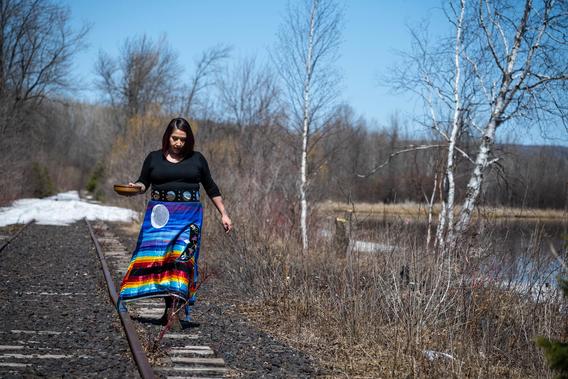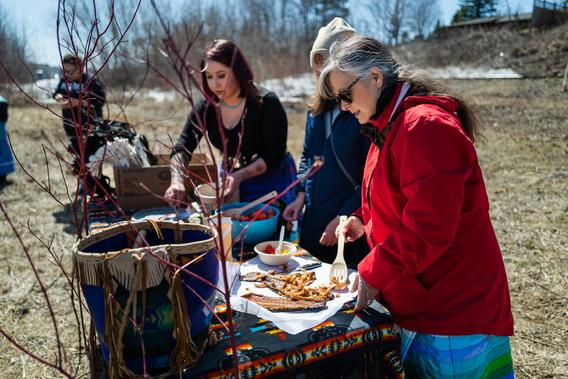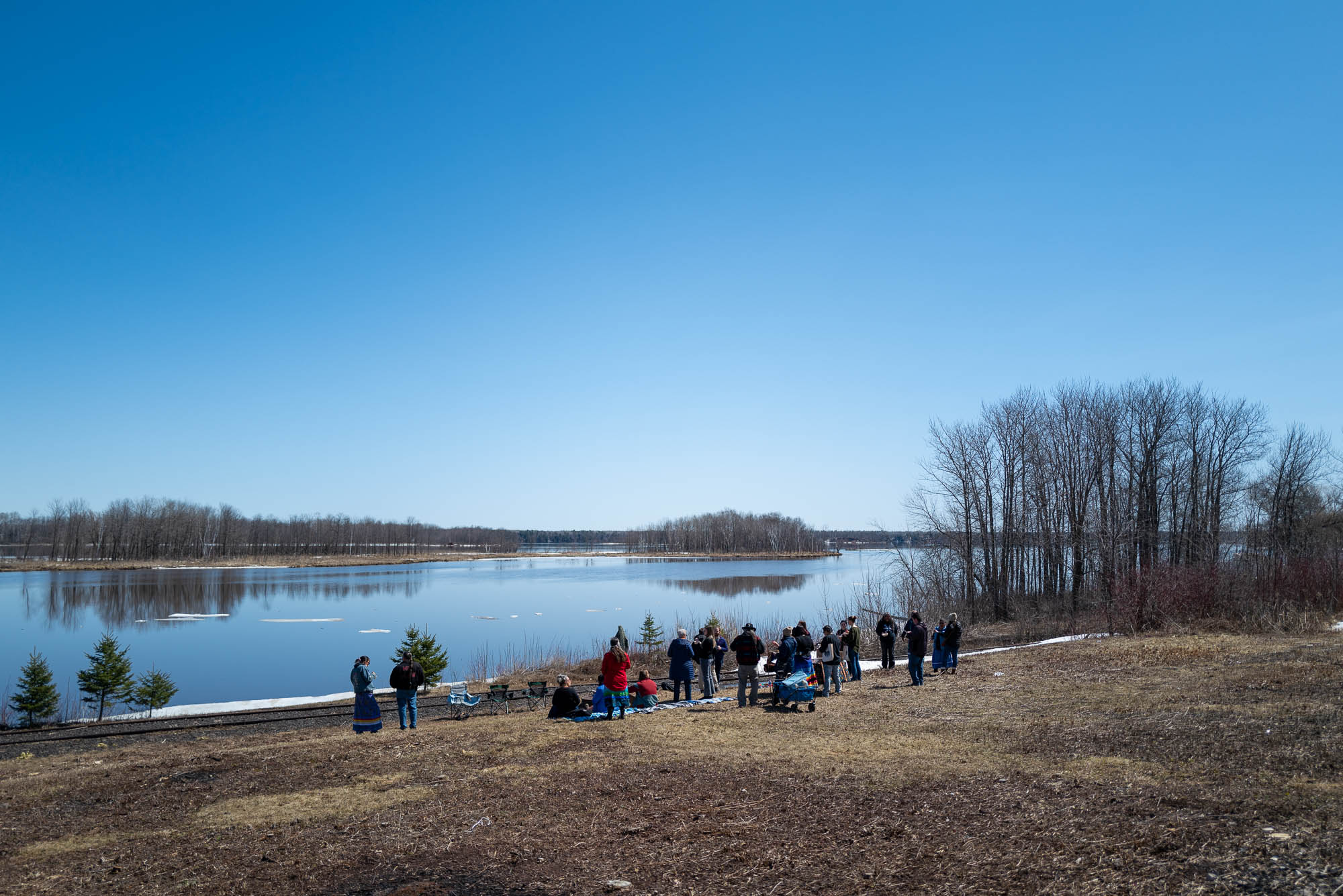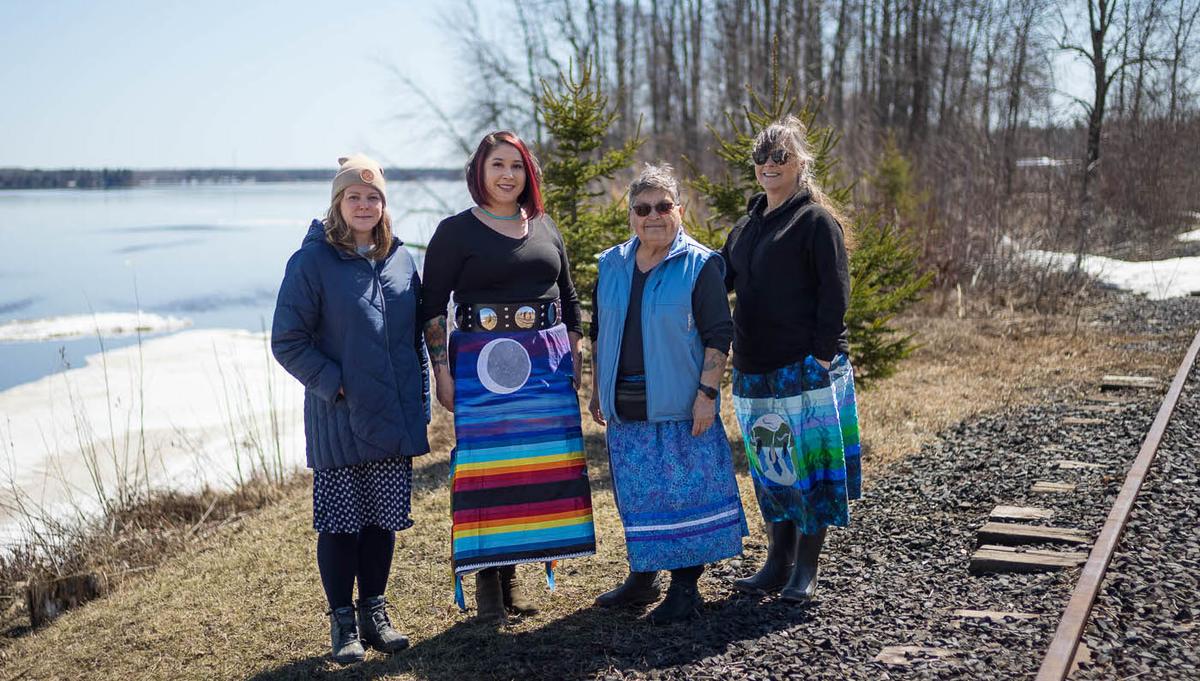On a sunny and unseasonably warm Duluth day in April, a group of scholars, students, city employees, community members and Indigenous elders converged by the St. Louis River near Munger Landing for the groundbreaking of a new outdoor classroom and ceremonial space.

The event began with a ceremony led by Sharon Day, an elder of the Bois Forte Band of Ojibwe who is known for her water walks, which raise awareness about the critical need to protect waterways.
In Ojibwe and English, Day invited everyone to pay tribute to the “nibi” (water) as well as the place. There was sage smudging and singing. Attendees were given a pinch of “asema” (tobacco) to make individual offerings to the water. Later the group enjoyed a bowl of wholesome Native foods together, including berries, smoked fish and wild rice.
“This is letting Earth and water know we wish to collaborate with them going forward. We want to be in positive relation with them and all the beings that live in that place … People can use this space to learn about, pray for and protect the water. Hopefully wherever they work, travel or reside, they will take this awareness to educate and defend their own watersheds,” explains Roxanne Biidabinokwe Gould, UMD associate professor emeritus in the UMD Department of Education and the Ruth A. Meyers Center for Indigenous Education.

The outdoor classroom and ceremony space is expected to be completed in 2024. It will be located along a soon-to-be developed section of the Waabizheshikana (waa-bah-zhay-shay-kuh-nuh), an Ojibwe word that translates to "the Marten Trail.” Formerly known as the Western Waterfront Trail, the newly renamed trail now honors the Marten Clan that initially settled in this area.
The classroom project was initiated by the Indigenous Women’s Water Sisterhood (IWWS) in partnership with the City of Duluth. It will provide experiential learning opportunities for students and community members. It will also serve as a space for “Native people to re-engage with the water like we once did,” says Gould, who is Grand Traverse Band Odawa/Ojibwe.
Gould has long been devoted to the protection of water. “My work has been focused on telling the story of water,” she says. “Water is a precious resource that deserves protection." In 2019, she received funding from the Mellon Environmental Stewardship, Place, and Community Initiative to create the IWWS. She enlisted a diverse group of primarily Native women to participate, including academics, a scientist, a student, community members and cultural practitioners.
Teaching stewardship
Indigenous people believe that water is the lifeblood of Mother Earth. Gould’s latest research focuses on Indigenous women, some of water’s fiercest protectors. Her forthcoming book, “Rematriating Her Lifeblood: Decolonizing Our Waters to Restore the Balance,” will chronicle and contextualize the stories of 30 water activists she interviewed across the United States.
The sisterhood extends the theme of this work to the Lake Superior watershed. Gould points out that Lake Superior isn’t immune from the impacts of climate change. “Our work has been focused on telling not just the story of the Lake Superior watershed but trying to engage people in the protection of it.”
The IWSS has a broad educational goal—to get people thinking about Indigenous people and the fact that they’ve lived sustainably on the Earth for thousands of years. “What can we learn from that? How can all humans live as good stewards to this place and the water?” Gould asks.
Because Indigenous people have maintained a sustainable relationship with the land and water for thousands of years, their traditional knowledge may hold solutions to impending environmental crises. Gould points out that although Indigenous people only hold about 20 percent of the land across the globe, that land is responsible for 80 percent of the world’s biodiversity.
“When we’re allowed to care for the natural world, we do a pretty good job… It would be advantageous, not only for us, but for the world, to support us,” Gould says.

As part of their educational mission, IWWS members wrote a children’s book, “Nibi Gizaagi’igoo Water We Love You,” which is free to download. Inspired by the activism of women like Day, it tells the story of water walkers, both in English and Ojibwe. The book includes beautifully vibrant illustrations as well as educational resources and activities for students to learn about science standards.
Establishing a strong reciprocal relationship between future generations and the water is key. That’s why the sisterhood has focused on reaching young people through its outreach and curriculum. In addition to the children’s book, IWSS sponsored “Nibi Giizagaagi’go” (Water is Life) Earth Day events in 2022 and 2023 at Fond du Lac Tribal and Community College to help educate, highlight student environmental research and connect students with scholars working in the field.
“It’s been a privilege to have access to the resources to do this work,” says Gould, who retired from UMD this month. She intends to focus on her book and anticipates the work of the sisterhood will continue. “What can I do, what can I give back to the community, to Indigenous people and the Earth, for having the privilege of doing this work?” she asks. “ My intention is to leave a better place for our grandchildren…for everybody’s grandchildren.”

The original members of the Indigenous Women’s Water Sisterhood are Roxanne Gould, Wendy Smythe, Mindy Granley, Renee Gurneau, Rachel King, and Arianna Northbird.
Photos by Alex Messenger. Image at top features (L to R): Mindy Granley, Arianna Northbirtd, Sharon Day and Roxanne Gould.
Related story: A relational approach
